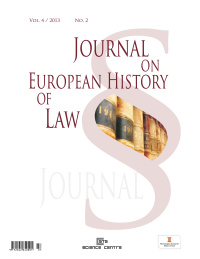Europäische Einigungsbestrebungen in der Weimarer Republik und in der Zwischenkriegszeit
European Integration Efforts in the Weimar Republic and during the Interwar Period)
Author(s): Diemut Majer, Wolfgang HöhneSubject(s): Law, Constitution, Jurisprudence
Published by: Evropská společnost pro právní dějiny, z.s.
Keywords: Napoleon - congress of Vienna 1815; Holy Alliance 1815; German Federation (Deutscher Bund) 1815; Paneuropa; NS-Propaganda (Großgermanisches Reich); European unification after 1945.
Summary/Abstract: The european idea was created in 14th and had its impact till in our days. They were widespread in the 15th to 18th century, but were also strong in modern times. Napoleon himself had ideas of an Europe consisting of satellite states dominated by him, as he confessed in his last days on St-Helena. During the Vienna-Congress 1815 and the following years the leading powers Austria, Russia and Prussia established the Holy Alliance in order to preserve order and peace in Europe and to opress the revolutionary movements since the 1830th. Concerning the 20th century the essay points out the remarkable revival of the european project after World-War-I. Nobody beliefed in the 1920th in a revival of european ideas, because the treaty of Versailles contained so many clauses, aimed to humiliate the former enemy Germany, (e.g. article 153, which declared Germany and its alliies as the sole responsibles for the war), so that any european agreement seemed impossible. It was a private organisation, the Paneuropa-Movement, set up by the count Coudenhove-Kalergi, which tried to reconstruct the revival of Europe. Supported by the french foreign minister Aristide Briand (Briand-memorandum 1930), he succeeded in setting up a big movement which had much resonance in the public. In the era of World-War-II the Nazi goverment misused the european idea as a means for a widespread propaganda in all occupied territories which aimed to construct "Gross-Germanisches-Reich" under German domination - an illusion because the NS-collaboration in the occupied countries soon found out that they were only an instrument in the hands of the ruthless dictator Hitler.
Journal: Journal on European History of Law
- Issue Year: 4/2013
- Issue No: 2
- Page Range: 15-23
- Page Count: 9
- Language: German

